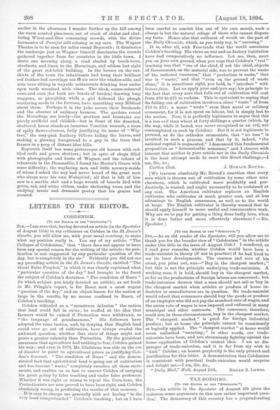[TO THE EDITOR Or THE " SPECTATOR:] Silt,—As an old
reader of the Spectator, will you allow me to thank you for the broader view of "Cobdenism" in the article under this title in the issue of August 11th ? I wondered, as I read your remarks, whether Cobden would have been a trade-unionist in theory (if not in practice) if he had lived to see its later developments. The essence and core of his creed, you point out, was—" Buy in the cheapest market;" but this is not the principle underlying trade-unionism. A working man, it is held, should buy in the cheapest market, so far as the productions of foreign labour are concerned ; but trade-unionism decrees that a man should not sell or buy in the cheapest market when articles or produce of home in- dustries or manufactures are in question. No trade-unionist would admit that consumers should buy the goods or produce of an employer who did not pay the standard rate of wages, and the union rate of wages is now imposed and enforced in many municipal and other contracts. The consumer, therefore, could not, in these circumstances, buy in the cheapest market. The " cheapest market " is good for foreign industrial produce; but at home the principle cannot be consistently or logically applied. The " cheapest market " at home would mean unlimited "sweating ; " in other words, our trade- unionists have been, and are, strenuously fighting against the home application of Cobden's central idea. I am no dis- parager of trade-unionism, and it is far from my wish to "kick" Cobden ; an honest perplexity is the only pretext and justification for this letter. A demonstration that Cobdenism is consistent with practical trade-unionism would surprise and delight me.—I am, Sir, &a., "Daily Mail," Hull, August 13th. EDGAR S. LEWIS.


































 Previous page
Previous page